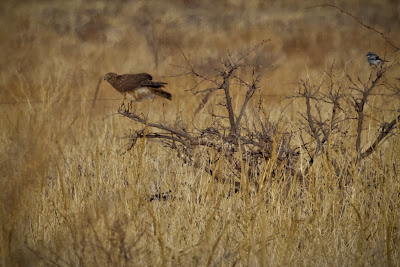Don’t try to sneak up on an eagle.
It doesn’t work and it leaves you feeling frustrated and
foolish.
I mention this, just in case you don’t already know it.
I made trips to Menasha and Prairie du Sac, Wisconsin
recently to look for Bald Eagles. My good friend, Fred Thorne, a fellow bird photographer joined
me. These pictures are combined from those two trips.
Bald Eagles congregate near open water to fish. That‘s often
below a dam or at narrows in the river where the water moves too fast to freeze.
There could be a few eagles, a dozen eagles or a hundred eagles, depends
on the fish…we wouldn’t know until we got there.
A hundred Bald Eagles in one place would be wonderful for
photographers like Fred and me, but the eagles wouldn’t like that.
Bald Eagles aren’t social birds. They don't like crowds.
A cold spell forces them to congregate. They would prefer to
have all the fish to themselves.
Squabbles break out in these confined areas and stealing
a fish is a common occurrence.
Bald Eagles are not city-dwellers either. They tolerate
noise, traffic and people only because they have to.
They allowed some encroachment of their space, but drew a line in the snow at photographers.
Unfortunately, we never saw that line in
the snow. We must have crossed it because they flew away.
Giving up, we packed up and drove up to Kaukauna.
Kaukauna was better for us, but no quieter for the eagles.
Workmen were deconstructing a downtown warehouse and dropped concrete and steel
out a second story opening onto the pavement below making an awful racket. A
Bald Eagle would have to be quite hungry to put up with that noise, but some
did,
Their hunger gave us hope.
 |
| Photo: Fred Thorne |
Fred uses his camera hand-held and I use a tripod. Being more portable, Fred is better able to photograph flying eagles. He caught this young eagle landing on a snag.
Bald Eagles spend a large portion of their day just sitting in
trees, as they were this day, but around noon they all rose into the air and
started to circle.
They weren’t fishing, they were playing.
The younger eagles seemed to be having the most fun…chasing
others...
…diving at one another...
...mock attacks with closed talons.
The adults joined in the circles, too, but they were more
likely the ones to be attacked. I can’t say these eagles were related, but
who other than a parent would put up with such bad behavior.
The circling and soaring went on for forty-minutes, then
stopped just as abruptly as it started.
In Prairie du Sac we looked to find Bald Eagles actually catching fish.
We found them fishing, poorly, I thought.
Coming up empty time after time, I thought these eagles were
just bad at fishing, but later discovered they were actually catching fish…small
fish…tiny fish…shad.
Repeatedly dipping into the water to strike at something, most
catches were so small as to be invisible at a distance.
So small they weren’t worth landing in a tree to eat, so the
eagles ate them in the air…like popcorn. Head down and feet forward, the
talon-to-beak fish transfer was made and munched.
Choosing to eat your catch on the fly solves another eagle
problem too…robbery!
Bald Eagles are not above stealing a fish, eating carrion or
even garbage to survive.
Early Americans knew that when they picked the
Bald Eagle as our national emblem in the 1782, but they chose the Bald Eagle
anyway. Benjamin Franklin wrote the Wild Turkey was a more honorable and
suitable symbol for the new United States of America, but he lost that
argument.
Your opportunity to see these beautiful birds in person is
better now than it ever has been.
With protection provided by the Endangered Species Act in 1978,
a ban on the pesticide DDT and ultimately a human appreciation for what we were
about to lose, the Bald Eagle has recovered to become a wintertime tourist
attraction. Many communities have eagle day events…cashing in on the Bald
Eagle’s magnificence. It’s a success story that needs
repeating.
Allan













































